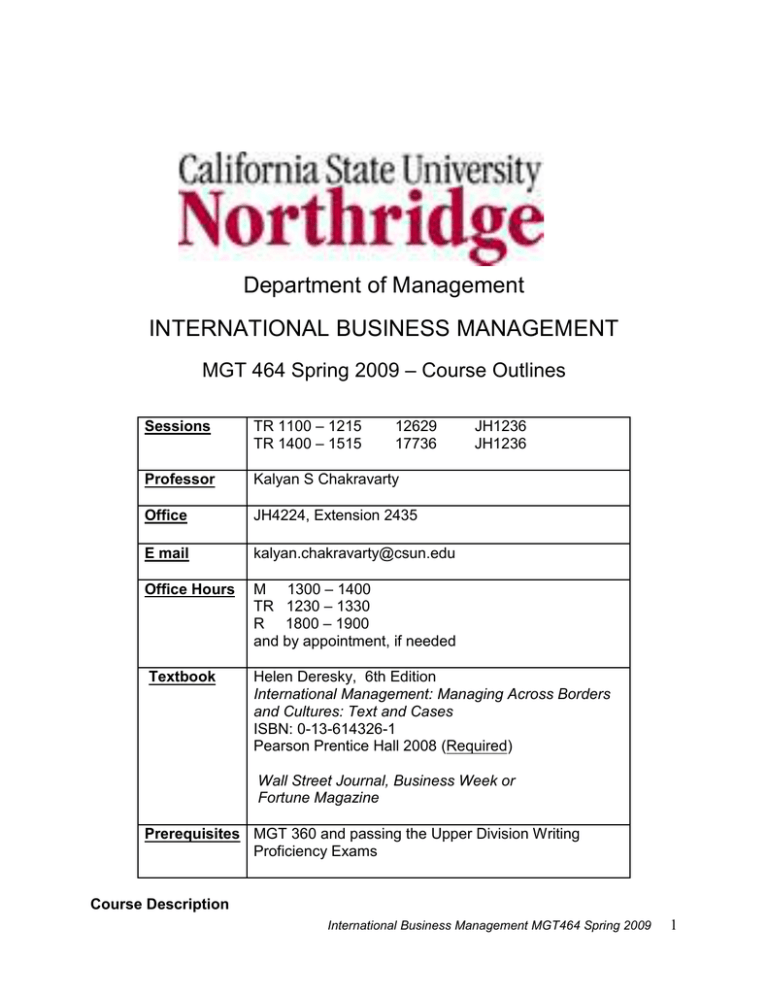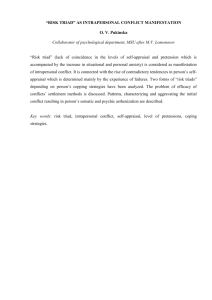
Department of Management
INTERNATIONAL BUSINESS MANAGEMENT
MGT 464 Spring 2009 – Course Outlines
Sessions
TR 1100 – 1215
TR 1400 – 1515
Professor
Kalyan S Chakravarty
Office
JH4224, Extension 2435
E mail
kalyan.chakravarty@csun.edu
Office Hours
M 1300 – 1400
TR 1230 – 1330
R 1800 – 1900
and by appointment, if needed
Textbook
Helen Deresky, 6th Edition
International Management: Managing Across Borders
and Cultures: Text and Cases
ISBN: 0-13-614326-1
Pearson Prentice Hall 2008 (Required)
12629
17736
JH1236
JH1236
Wall Street Journal, Business Week or
Fortune Magazine
Prerequisites MGT 360 and passing the Upper Division Writing
Proficiency Exams
Course Description
International Business Management MGT464 Spring 2009
1
This course has been designed to introduce the principles and practices of managing
international businesses effectively. It is an integrative interdisciplinary course
portraying a broad view of the burgeoning level, scope, and complexity of international
businesses facing managers in the twenty first century - while taking a general
management perspective throughout the curriculum.
Global companies are faced with dynamic environments in which they must accurately
assess the political, legal, technological, competitive, and cultural factors that shape
their strategies and operations. The success of overseas operations depends greatly on
the international manager’s cultural skills and sensitivity, as well as the ability to carry
out the company’s strategy within the context of the host country’s business practices.
The emphasis of the course will be on sharpening the analytical and decision-making
skills necessary for strategy formulation, implementation and control of international
operations.
The learning objectives are:
1. To understand the current environmental forces impacting international business
and analyze the key issues faced by a global firm in managing them proactively
around global interdependence.
2. To recognize the importance of the role of culture in business and its impact on a
firm’s performance while examining critically how strategies for international and
global operations can be formulated and implemented effectively to achieve
sustained global competitiveness.
3. To understand key implementation issues faced by a firm in devising global
organization structure and control system for effective global human resources
management, while making relevant and reasonable strategic recommendations
for the firm.
4. To be able to recommend a set of viable strategies that the firm might pursue
and communicate this analysis in a concise and persuasive fashion.
Preparations
While the course will have a judicious blend of a few teaching methodologies and aids,
it will focus on group work and experiential exercises including the analysis of a few
cases, articles, etc. The students are expected to prepare themselves well in advance
before each session in order to participate in the discussions meaningfully. The
assigned readings must be read thoroughly before the class in order to derive maximum
mileage from each session.
Course Work
International Business Management MGT464 Spring 2009
2
The evaluation and grading will be based on the following course work. The
components described below are designed, both independently and collectively, to
achieve the course objectives. Each component is important both by itself and as a key
part of the overall system (so any major omission may lead to an F for the course).
Group Project
Host Country Presentation (Triad)
Written Case Analysis (Individual)
Middle Term Test (2)
Punctuality, Attendance, Participation
Total:
25 pts
20 pts
15 pts
30 pts
10 pts
100 pts
A. Group International Management Project (25%)
Students will form groups of five or less, and each group will conduct an in-depth
analysis of:
1) a multinational corporation (a different one for each group) and its current operations
at least in one country outside USA, or
2) a proposed new business venture outside USA or
3) a proposed expansion for an existing firm in its markets outside USA.
They will research the writings related to this focal company, identify the issues the
company has been confronted with, and/or it is likely to confront when competing in the
current global environment while applying the concepts and models described in the
class.
The aspects to be covered should include:
(1) Basic company information including a brief background, the industry, the basic
technology and process, current performance, customer bases, suppliers and other
significant stakeholders as the group members see appropriate,
(2) the general environment,
(3) the host country environment with prime focus on the relevant cultural context and
specific industry characteristics existing in the host country,
(4) the strategy formulation and implementation issues including the interplays among
the major global competitors, and
(5) the strategic recommendations based on your analysis of the firm.
The outcome of this paper should be a better understanding of the company, the
industry, and its strategy formulation and implementation issues in the host country
environment in particular, and the ability to understand the broad issues relevant to
international business management in general.
While the instructor will provide structured guidelines and feedback on the project on an
ongoing basis, the students are expected to take active roles in its design and
satisfactory completion.
International Business Management MGT464 Spring 2009
3
The group will then make a formal presentation of the analysis in the class, with each
member of the group getting an opportunity to handle a section of the presentation. The
total time allotted for each group will be thirty minutes.
Please practice prior to the presentation so that you will be able to finish the report
within the given time limit. The presentation of each group will be evaluated by the
instructor using predetermined criteria based on the contents specified above and the
quality of presentation (introduction, style, structure, preparation and visual aids).
Each group will also submit a written report. The data used for the analysis and
presentation should be up-to-date and could be from primary or published data sources,
and the analyses will be conducted in the context of the course and its coverage. All
references must be specified on a separate page. We will also utilize electronic
submission for the project report.
The completed report must be turned in on the day the group makes its
presentation.
Attendance in all group presentations is mandatory.
B. Host Country Triad Project (20%)
Students will form groups of three (triads), and each group will conduct an in-depth data
collection and analysis of one country outside USA (a different one for each group) to
be allotted at an appropriate time. They will research and analyze the relevant data and
the writings related to this country in a prescribed template, to be provided later, in order
to present their findings on the current scope, complexities, opportunities and threats in
the chosen country.
The total time allotted for the triad presentation will be twenty minutes. Once again, it is
recommended you practice prior to the presentation to be able to deliver it satisfactorily
within the stipulated time limit. Each triad will also submit a written report for evaluation
by the instructor. More details shall be provided later in the course.
The completed report must be turned in on the day the triad makes its
presentation.
C. Individual Written Case Analysis (15%)
There will be one multinational company case to be distributed in advance of the class.
Each student will be required to submit a written report around a few specific questions
raised on the case, on the scheduled date and time, presenting a coherent and
defensible analysis of the situation based on international business management
International Business Management MGT464 Spring 2009
4
practices learnt. The report will be evaluated based on the application of the concepts
and practices learnt in the course.
They are intended to provide an opportunity to actively experience the reality and
complexity of the issues facing practicing international managers today. Among other
benefits, they would help the students sharpen their analytical and problem-solving
skills.
The report should be an individual effort and anyone attempting to share analyses and
ideas will be penalized. More details shall be provided later in the course.
D. Middle Term Test (30%)
There will be two non-cumulative middle term tests consisting of a combination of
multiple choice questions, true/false statements, and short essays on topics related to
course curricula.
E. Punctuality, Attendance and Class Participation (10%)
Class attendance is absolutely essential. There will be no penalty for those with a
maximum of five absences. Students with six or more unexcused absences may
run the risk of even failing in the course. Habitual lateness and/or leaving the
classes early, for whatever reasons, are evidence of low commitment and will be
penalized. Make up exercises will not be accepted after the final instruction class on
05/07/09.
Please come to each class prepared to discuss the readings and assignments and to
play an active role in contributing to class discussions. Those making insightful
comments that increase the level of energy and interest in the topics discussed would
definitely make a discernible impact than others.
A superior participation score is given to one who demonstrates the ability to comment
upon the content and the process of our discussions. Some questions to help illustrate
the preferred mode are:
Does the group become more energized after this person contributes? Is this
person more focused?
Does this person listen to others and build upon their ideas?
Grading
The final letter grade assigned to each student will be determined by the students’
performance on the course components mentioned above.
Other Issues
International Business Management MGT464 Spring 2009
5
1. The College of Business and Economics at California State University, Northridge
prepares students to be ethical decision makers. The college maintains high
standards of ethical conduct that students are expected to maintain throughout their
academic and professional careers. Students in the College of Business and
Economics have identified the values of respect, honesty, integrity, commitment, and
responsibility as their guiding principles. 2. This syllabus is the basic guideline for
various activities related to this class. Please read it carefully, and refer to it as we
proceed.
3. Please talk to me as soon as possible if you have any suggestions, questions,
problems and concerns.
4. Time management is critical when dealing with many, and often conflicting
demands. Such demands could be from your studies, your work, and/or personal
obligations. To deal with them effectively, you must set up your priorities straight and
work accordingly. (When in this class, you are required to engage fully in activities in
this class.)
5. All instances of academic dishonesty will be dealt with strictly according to the
University policies and guidelines.
6. All students are required to use the CSUN computing facility to send and
receive email communications.
MGT 464 Spring 2009 - Timetable
SESSIONS
TOPICS, TASKS, READINGS
International Business Management MGT464 Spring 2009
6
1/20
1/22
1/27
1/29
Housekeeping, Course Introduction;
Clarifying Mutual Expectations.
Preparing for an Effective Case Analysis.
Video Case: Debate on Globalization
Assessing the Global Manager’s Environment:
Political, Economic, Legal, Technological
Readings: Chapter 1
Case: Google in China: The Big Disconnect
2/10
Presenting the Template for Host Country Presentation
Establish Presentation Teams/Triads
Video Case: Global Business and Ethics
Managing Interdependence: Social Responsibility and Ethics
Readings: Chapter 2
Case: Coca-Cola’s Business Practices: Facing the Heat in a
Few Countries
Guidelines for Group International Management Project
2/12
Guidelines for Host Country presentation: An Update
2/17
Video Case:
Impact of Culture on Business: Spotlight on Latin America
Understanding the Role of Culture
Communicating across Cultures
Readings: Chapters 3 & 4
Video Case:
Communicating Effectively in the Global Workplace
Host Country Presentation: Triad 1
Case: Guanxi in Jeopardy
Cross-cultural Negotiation and Decision Making
Readings: Chapter 5
Host Country Presentation: Triad 2
Formulating Strategy for International and Global Operations
Readings: Chapter 6
Host Country Presentation: Triad 3
Video Case:
Understanding Entry Modes into the Chinese Market
Host Country Presentation: Triad 4
2/3
2/5
2/19
2/24
2/26
3/3
International Business Management MGT464 Spring 2009
7
MGT 464 Spring 2009 - Timetable
SESSIONS
3/5
3/10
3/12
3/17
3/19
3/24
3/26
4/2
4/14
4/16
4/21
4/23
4/28
4/30
5/5
5/7
1
TOPICS, TASKS, READINGS
Global Alliances
Readings: Chapter 7
Host Country Presentation: Triad 5
Implementing Strategy for International and Global Operations
Readings: Chapter 7
Host Country Presentation: Triad 6
Group International Management Project: An Update
Preparing for Middle Term I
Host Country Presentation: Triad 7
MIDDLE TERM I
Organization Structure and Control Systems
Readings: Chapter 8
Host Country Presentation: Triad 8
Video Case: Global HRM
Staffing, Training, and Compensation for Global Operations
Readings: Chapter 9
Host Country Presentation: Triad 9
Case: Starbucks’ International Operations - 2006
Host Country Presentation: Triad 10
Developing a Global Management Cadre
Motivating and Leading a Global Team
Readings: Chapters 10 & 11
Host Country Presentation: Triad 11
Preparing for Middle Term II
Host Country Presentation: Triad 12
MIDDLE TERM II
Preparatory Work for Group Project Presentations
Host Country Presentation: Triad 13
Case Analysis: Individual Written Assignment
GROUP INTERNATIONAL MANAGEMENT PROJECT:
PRESENTATIONS AND DISCUSSIONS
GROUP INTERNATIONAL MANAGEMENT PROJECT:
PRESENTATIONS AND DISCUSSIONS
GROUP INTERNATIONAL MANAGEMENT PROJECT:
PRESENTATIONS AND DISCUSSIONS
GROUP INTERNATIONAL MANAGEMENT PROJECT:
PRESENTATIONS AND DISCUSSIONS
The timetable is subject to change.
International Business Management MGT464 Spring 2009
8




